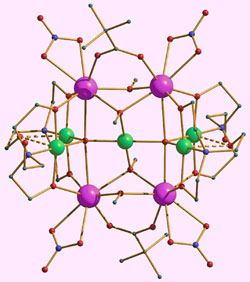 Scientists have laid the foundations for a high-performance ‘molecular fridge’ capable of reaching temperatures within a few thousandths of a degree of absolute zero (0K) with a high degree of efficiency. Such ultracoolers could have applications in areas such as ultra-low temperature physics, where alternative technologies such as those that rely on expensive and rare helium-3 could be unsuitable or too costly.
Scientists have laid the foundations for a high-performance ‘molecular fridge’ capable of reaching temperatures within a few thousandths of a degree of absolute zero (0K) with a high degree of efficiency. Such ultracoolers could have applications in areas such as ultra-low temperature physics, where alternative technologies such as those that rely on expensive and rare helium-3 could be unsuitable or too costly.
The system relies on a phenomenon called the magneto-caloric effect, where the removal of a magnetic field from a ferromagnetic material causes a drop in temperature. The key to achieving a high magneto-caloric effect is to have a material with many unpaired electrons, all of whose spin states are aligned.
Euan Brechin from the University of Edinburgh in the UK, Keith Murray from Monash University in Australia and Marco Evangelisti from the University of Zaragoza in Spain and their colleagues designed a molecule based on gadolinium and copper, which can be cooled to a few millikelvin.
Read the rest of the news story on the Chemistry World website and download the group’s Chemical Science Edge article for free.
Think this is cool? Let us know by leaving your comments below.










